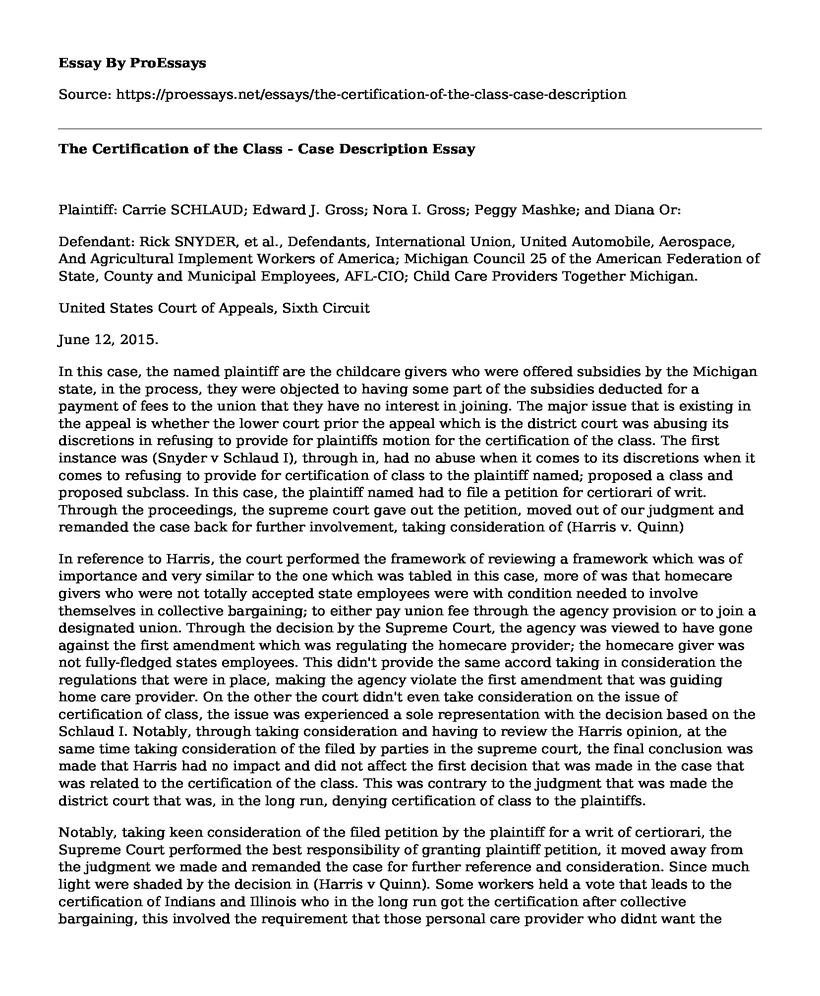Plaintiff: Carrie SCHLAUD; Edward J. Gross; Nora I. Gross; Peggy Mashke; and Diana Or:
Defendant: Rick SNYDER, et al., Defendants, International Union, United Automobile, Aerospace, And Agricultural Implement Workers of America; Michigan Council 25 of the American Federation of State, County and Municipal Employees, AFL-CIO; Child Care Providers Together Michigan.
United States Court of Appeals, Sixth Circuit
June 12, 2015.
In this case, the named plaintiff are the childcare givers who were offered subsidies by the Michigan state, in the process, they were objected to having some part of the subsidies deducted for a payment of fees to the union that they have no interest in joining. The major issue that is existing in the appeal is whether the lower court prior the appeal which is the district court was abusing its discretions in refusing to provide for plaintiffs motion for the certification of the class. The first instance was (Snyder v Schlaud I), through in, had no abuse when it comes to its discretions when it comes to refusing to provide for certification of class to the plaintiff named; proposed a class and proposed subclass. In this case, the plaintiff named had to file a petition for certiorari of writ. Through the proceedings, the supreme court gave out the petition, moved out of our judgment and remanded the case back for further involvement, taking consideration of (Harris v. Quinn)
In reference to Harris, the court performed the framework of reviewing a framework which was of importance and very similar to the one which was tabled in this case, more of was that homecare givers who were not totally accepted state employees were with condition needed to involve themselves in collective bargaining; to either pay union fee through the agency provision or to join a designated union. Through the decision by the Supreme Court, the agency was viewed to have gone against the first amendment which was regulating the homecare provider; the homecare giver was not fully-fledged states employees. This didn't provide the same accord taking in consideration the regulations that were in place, making the agency violate the first amendment that was guiding home care provider. On the other the court didn't even take consideration on the issue of certification of class, the issue was experienced a sole representation with the decision based on the Schlaud I. Notably, through taking consideration and having to review the Harris opinion, at the same time taking consideration of the filed by parties in the supreme court, the final conclusion was made that Harris had no impact and did not affect the first decision that was made in the case that was related to the certification of the class. This was contrary to the judgment that was made the district court that was, in the long run, denying certification of class to the plaintiffs.
Notably, taking keen consideration of the filed petition by the plaintiff for a writ of certiorari, the Supreme Court performed the best responsibility of granting plaintiff petition, it moved away from the judgment we made and remanded the case for further reference and consideration. Since much light were shaded by the decision in (Harris v Quinn). Some workers held a vote that leads to the certification of Indians and Illinois who in the long run got the certification after collective bargaining, this involved the requirement that those personal care provider who didnt want the involvement or be part of the union to pay a fair share and the fee was to be directly deducted from their salaries. The case played a very significant role in the society; it helped to bring knowledge on some of the procedure to be followed, especially when dealing with unions. It showed how district court judgment was so unjust and it denied justice through refusing to offer class certification, on the other, it showed the good work of Supreme Court through their procedural work and justice. It also considered all society through making sure that every right is respected.
Reference
Harris v. Quinn. Snyder v. Schlaud U.S 13 S.Ct.2899, 189 L.Ed.2d 852 99(2014)
Snyder v Schlaud I), 717 F.3d 451(6TH Cir.2014)
Cite this page
The Certification of the Class - Case Description. (2021, Mar 22). Retrieved from https://proessays.net/essays/the-certification-of-the-class-case-description
If you are the original author of this essay and no longer wish to have it published on the ProEssays website, please click below to request its removal:
- Creative Writing: A Photographer Goes on a Killing Spree
- The Affordable Care Act: Impacts on Nursing Practice
- The Use of Contract to Protect Property Rights: Assignment Sample
- Essay Example on Mother's Right to Refuse Unwanted Healthcare Treatment
- The Criminal Justice System: Preventing Crime and Delivering Justice - Essay Sample
- Research Paper on Russia's Cyberwar: Revenge and Security Against Global Cyberattacks
- Defendant's Reckless Act Proportional to Intentional Murder: States' Laws on Dangerous Dogs - Essay Sample







